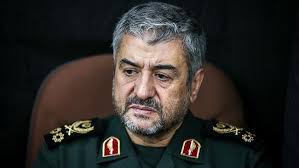By Joseph Braude
With the death toll in anti-government protests across Iran now at 21, Tehran has deployed the elite Revolutionary Guards Corps in three provinces: Hamadan, Isfahan, and Lorestan. In a sign of personal stress, IRGC Major General Mohammad Ali Jafari referred to protests as “the new sedition.” Meanwhile, in another show of state-sponsored reaction to the phenomenon, thousands of Iranians participated I rallies in support of the government, widely broadcast on state television. Pro-government rioters through their slogans sent a clear message: “The blood in our veins is a gift to our leader … We will not leave our leader alone.” Reuters reports that the rioters also repeatedly chanted that the U.S., Israel, and UK were behind the demonstrations. IRGC’s Jafari also declared that the anti-government protests were “over.”
Meanwhile, the anti-government demonstrations have indeed continued — their message unmistakable. Video relayed on social media shows repeated chants against Iranian interventionist policies in Arab lands as well as explicit insults to regime figures and calls for their execution. There are indications of further momentum, and that some labor unions as well as disaffected ethnic minority opposition groups, notably Kurds, have joined in the demonstrations.
Among reactions outside Iran, Iran-backed Hezbollah leader Hassan Nasrallah spoke on the Beirut-based network Al-Mayadeen and assured the public that Iranian authorities were dealing “calmly and wisely” with the protests and declared that they were “nothing to worry about.” Western European leaders, for their part, have continued to avoid lending moral support to protestors, and more often criticize the United States and its allies than the Iranian government. Thus French president Emmanuel Macron criticized American, Israeli, and Saudi statements of solidarity with protestors as carrying a tone that “would lead us to war … a deliberate strategy for some.” Germany’s foreign minister stated that he worried about international escalation of what should be seen as an “internal Iranian conflict.” UN High Commissioner for Human Rights Zeid Raad al-Hussein has called for an investigation.
The American administration, for its part, has intensified its support for protestors. Vice President Mike Pence published an opinion piece in the Washington Post asserting again that the U.S. would not repeat the Obama policy of snubbing the Green Revolution in 2009 which, in his view, “shows the disastrous price of silence.” Pence castigated European leaders for adopting a similar approach: “It’s time for them to stand up. … The president and I call on leaders of freedom-loving nations across the world to condemn Iran’s unelected dictators and defend the Iranian people’s unalienable right to charge their own future and determine their own destiny.” While a chorus of Obama loyalists continues to call noisily for silence, some fissures are emerging within the American liberal camp. New York Times columnist Roger Cohen, a supporter of the Iranian nuclear deal, broke with his critical stance toward President Trump in declaring, “Trump is right, this time, about Iran.”













